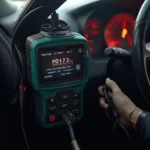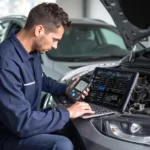Can you check mileage through the OBD2 port? Many car owners and potential buyers wonder if the OBD2 port, that ubiquitous diagnostic interface, holds the secret to a vehicle’s true mileage. This article delves deep into the topic of obd2 port mileage check, separating fact from fiction, and providing you with a comprehensive understanding of what information you can access through this port and what limitations exist.
Unveiling the Truth About OBD2 Port Mileage Checks
The OBD2 port, primarily designed for diagnostics, offers a wealth of information about a vehicle’s systems. While some data points accessible through this port might indirectly relate to mileage, it’s crucial to understand that a direct, foolproof obd2 port mileage check for true mileage isn’t universally guaranteed. Several factors contribute to this complexity.
How Mileage is Recorded and Why it Matters
Vehicle mileage is typically recorded in the odometer, a device often manipulated to misrepresent a car’s usage. This fraudulent practice, known as “odometer rollback” or “clocking,” can significantly impact a vehicle’s perceived value. Buyers rely on accurate mileage readings to gauge wear and tear, predict maintenance needs, and ultimately, determine a fair price. Therefore, the quest for reliable mileage verification methods, including the potential of the obd2 port mileage check, becomes paramount.
What an OBD2 Scanner CAN Tell You
While a direct obd2 port mileage check for the exact mileage recorded on the odometer might not always be possible, an OBD2 scanner can provide valuable insights that can suggest potential mileage discrepancies. Here’s what you can typically access:
- Engine Hours: This reveals the total time the engine has been running. Comparing engine hours to the odometer reading can sometimes reveal inconsistencies. For instance, low mileage coupled with high engine hours might raise a red flag.
- Diagnostic Trouble Codes (DTCs): While not directly related to mileage, DTCs can indicate past issues that could correlate with higher-than-reported mileage. For example, multiple repairs related to wear-and-tear components might suggest the vehicle has seen more use than the odometer indicates.
- Module-Specific Mileage: Some vehicles store mileage data in various electronic control units (ECUs). Accessing this information with a professional-grade OBD2 scanner might offer a more comprehensive picture, but it’s not standardized across all makes and models.
Limitations of OBD2 Port Mileage Checks
It’s crucial to acknowledge the limitations of relying solely on an obd2 port mileage check for accurate mileage verification:
- No Standardized Location: There’s no single, universally designated location within the OBD2 data stream for storing the true odometer reading. This varies significantly across manufacturers and models.
- Potential for Manipulation: Just as odometers can be rolled back, the data accessible through the OBD2 port can also be manipulated in some cases.
- Varied Accessibility: Accessing module-specific mileage data often requires specialized, advanced OBD2 scanners and in-depth knowledge of specific vehicle systems.
Alternative Methods for Mileage Verification
Given the limitations of the obd2 port mileage check, it’s advisable to utilize a combination of methods for verifying mileage:
- Vehicle History Reports: These reports can reveal reported mileage at various points in the vehicle’s history, potentially uncovering discrepancies.
- Physical Inspection: Inspecting the vehicle for wear and tear on components like the steering wheel, pedals, and seats can provide clues about its actual usage.
- Service Records: Consistent service records from reputable mechanics can corroborate mileage claims and provide insights into the vehicle’s maintenance history.
Expert Insight
“While the OBD2 port provides valuable data, relying solely on an obd2 port mileage check for true mileage verification is often insufficient,” advises John Davis, Automotive Diagnostics Specialist at Advanced Auto Solutions. “A comprehensive approach, including vehicle history reports and physical inspection, is essential for accurate assessment.”
Can You Check Mileage Through OBD2 Port? The Bottom Line
So, can you check mileage through the OBD2 port? The answer is nuanced. While the OBD2 port can provide valuable clues and supporting evidence, it doesn’t always offer a definitive answer to a vehicle’s true mileage. Using the information gleaned from the OBD2 port in conjunction with other verification methods is the most reliable approach to uncovering potential mileage discrepancies and making informed decisions. Always remember that professional advice from a trusted mechanic is invaluable when assessing a used vehicle’s history and condition.
FAQ
-
Can I check the mileage of any car with an OBD2 scanner? While all cars manufactured after 1996 in the US have OBD2 ports, access to mileage data varies significantly across makes and models.
-
Is it illegal to roll back an odometer? Yes, odometer rollback is illegal in most jurisdictions.
-
What’s the best OBD2 scanner for checking mileage? There’s no single “best” scanner for this purpose, as access to mileage data varies. Consult with a professional for recommendations based on your specific needs.
-
Are vehicle history reports always accurate? While generally reliable, vehicle history reports are not infallible. They rely on reported data, which can be inaccurate or incomplete.
-
What are some other signs of odometer tampering? Misaligned digits on the odometer, inconsistent wear and tear, and discrepancies between the odometer reading and service records are potential indicators.
If you need any further assistance, please don’t hesitate to contact us via WhatsApp: +1(641)206-8880, Email: [email protected] or visit our office at 789 Elm Street, San Francisco, CA 94102, USA. Our 24/7 customer support team is always ready to help.

